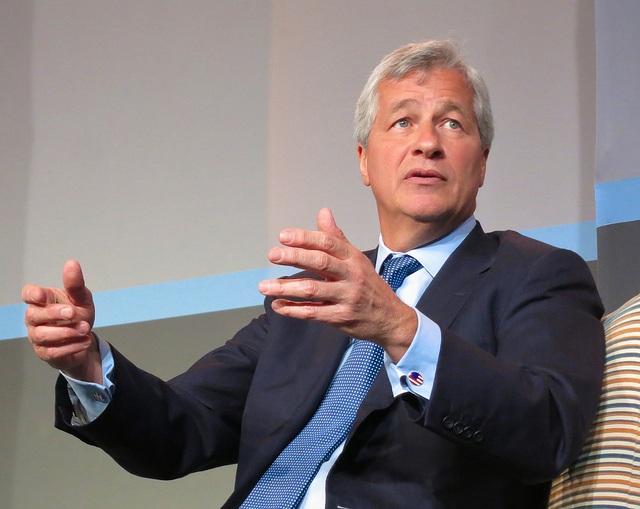
By Marc de Sousa Shields
Coffee sprayed from my mouth when I read JPMorgan Chase & Co. (JPMC) was recently recognized by Fortune as the number one company in its annual "Change the World" list.
Why?
Banks, particularly investment banks, in my mind, are second only to payday lenders as the resident evil of the banking industry. Sure, we need them, but unless you’ve live in a cave, you will remember the financial melt-down precipitated banks in 2008. You may also recall their dogged instance on deregulation since, or their obscenely high senior manager compensation in times of grotesque inequality.
I freely admit my reaction was based as much on what happened in 2008 and the resulting branding which stuck in my mind; I admit grudges are an unfair basis upon which to judge.
So, I decided to do some research and prove my distaste for (investment) banks in general and JPMC specifically. To my dismay… I found much to like.
For example, Fortune’s list recognized companies doing well by doing good, by addressing a sustainability problem, meaning JPMC was not selected for its overall sustainability performance but for revitalizing efforts in Detroit.
Looking at their private, public, and civil society model with its focus on small business, well, it’s clear the bank understands comprehensive local economic development. It’s so good, in fact, others and myself are likely to use its ideas in countries as far flung as Bangladesh and Nigeria.
Operationally, the bank is not awful. JMPC has notable internal and external stakeholder engagement, decent approaches to sustainable real estate management, and advanced diversity and gender policies. None perfect, all at least as good as their competitors.
The bank is also looking to use clean power only, and as of 2016, 100 percent of its purchased electricity in the UK, Germany and Luxembourg is from renewable sources. In the U.S., JMPC purchases a serious carbon energy and travel offsets via certified Renewable Energy Credits.
The bank also runs with a solid sustainability crowd, from Business and Sustainable Development Commission, Ceres, Equator Principles, Extractives Industry Transparency Initiative, Global Impact Investing Network, Green Bond Principles, U.N. Principles for Responsible Investment, and World Business Council for Sustainable Development.
But what about the $13 billion in fines for their role in 2008? Can’t pin all that on JPMC. Many of these fines came with JPMC’s (arguably) market-strengthening buy outs of Washington Mutual and Chase Bank.
JPMC did play the collateralized debt obligation game to the tune of around 20 percent of market share, but Jamie Dimon, the then newish CEO, cemented his risk management reputation by devolving out the business starting in 2006-7.
Several small- to medium-sized dubious ethical practices have occurred since, including the London Whale incident which incurred $6.2 billion losses in 2012. Small ball really, and nothing compared to most other banks.
The most substantial sustainability impact liabilities most financial institutions have, however, are found below the operating waterline: in their financing of companies which do irreparable harm to communities and the environment.
JPMC?
Like many banks, JPMC has a coherent sustainability financing strategy and asset management philosophy, defined, and staffed for each of its four main operating units.
It is also considered one of the largest funders of renewable energy in the U.S, committing or arranging nearly $20 billion wind, solar and geothermal projects between 2003 and 2016, with a promise of $200 billion in 2017.
JPMC also makes small “impact investments” in international and national funds such as MicroVest II (microfinance), LeapFrog Financial Inclusion Fund (micro-insurance), and Bridges Social Entrepreneurs Fund (social enterprise venture capital). And then there is the $150 million commitment in Detroit.
This is all good; but aside from Detroit, not much different from its competitors, and certainly much less than banking institutions like Triodos or VanCity.
One can also question the bank’s sustainability investment principles for not having concrete language available to Jane and Joe Public. This reduces its accountability, or, our ability to find out exactly what they invest in or not, and why. They do state coal and other forms of dirty energy are out, which is good to hear, but honestly, these days, that’s just good risk management.
Here is the rub.
Sure, JPMC is doing some good sustainability things, and in some ways, is a large financial institution sustainability pioneer.
But as a former banker and sustainable investment practitioner, I remain despondent that the bank has only 20 percent of long-term assets under management (AUM) filtered through environmental, social and governance criteria.
Knowing what we do about sustainability filters in practice, and like most sustainable and responsible investments in general, a good portion of JPMC’s sustainable AUM could simply avoid no brainers like tobacco and coal. Meanwhile, 80 percent, or $2 trillion, could be merrily financing all sorts of bad.
(By contrast, any one with internet access can see and judge exactly what is in any Domini Social Investment or PAX World, and we know all their AUM are assessed for sustainability).
All this said and done, I remain optimistically jaded in the face of the bank’s potential, and grudgingly happy to celebrate JPMC’s aspirational efforts.
Still, it strikes me unfair that the bank, wittingly or not, arbitrages far greater sustainability (and conventional) brand value than its quite modest sustainability performance justifies.
Banks could be the single most powerful private sector source of change supporting transformational corporate sustainability efforts, alas they are not.
Nonetheless, bravo JPMC, you deserve Fortune’s accolades, but please do more. Much more.
Marc de Sousa Shields writes on sustainability and is author of Invest Like You Give a Damn: Make Money, Change the World, Sleep Well at Night (New Society Publishing, November 2017).
TriplePundit has published articles from over 1000 contributors. If you'd like to be a guest author, please get in touch!














